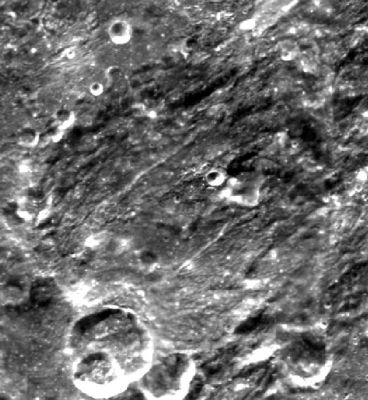Blackett
Contents
Blackett
| Lat: 37.5°S, Long: 116.1°W, Diam: 141 km, Depth: km, Rükl: (farside) | |
Table of Contents
Images
LPOD Photo Gallery Lunar Orbiter Images
Maps
([/LAC%20zone LAC zone] 122B4) USGS Digital Atlas PDF
Description
Blackett, a crater that formed during the [/Stratigraphy pre-Nectarian] period (~ 4.6 to 3.92 bn years), has been through the wars! Not only has it been battered to death by ejecta from the nearby [/Mare%20Orientale Orientale Basin] some 800 kilometres off to its north-east, but it also has taken its fair share of ejecta from the [/Mendel-Rydberg%20Basin Mendel-Rydberg Basin] some 350 kilometres away to its south-east. One would strain to see the effects of this latter event that occurred during the [/Stratigraphy Nectarian] period (~ 3.92 to 3.85 bn years), however, the former event which happened during the [/Stratigraphy Early Imbrium] period (~ 3.8 to 3.2 bn years) has left Blackett scarred for life. Obvious gouged striations running radial to Orientale's direction are easily seen, and most, if not all, of Blackett's northern rim-region shows signs of batterment. In the opposite, southern direction, the rim does look relatively better in comparison, however, several fairly big-ish craters ranging from 20 to 50 kilometes across have left their mark. In all, the crater's rim has been well worned down, its floor gouged and pummelled, and in general its entire face has taken on a less-than characteristic appearance for a crater of its age. All this warring and wearing-down has thus left Blackett a decrepit old man too long in the tooth for any more fighting.- JohnMoore2 JohnMoore2
Description: Wikipedia
Additional Information
Is there a large unnamed crater south-southeast of Blackett (see LAC 122 in the [/Clementine%20Atlas Clementine Atlas])?. The centre of this unnamed crater is located at approximately 44° South/ 114° West.
Nomenclature
- Named for Patrick Maynard Stuart Blackett (November 18, 1897 - July 13, 1974), an English experimental physicist known for his work on cloud chambers, cosmic rays, and paleomagnetism. He received the 1948 Nobel Prize for Physics for his investigation of cosmic rays using his invention of the counter-controlled cloud chamber.
- Blackett appears in a list of names for possible future use on the Moon published in [/IAU%20Transactions%20XVIB IAU Transactions XVIB] (1976).
- It was "approved as assigned" in [/IAU%20Transactions%20XVIIB IAU Transactions XVIIB] (1979).
- Not to be confused with [/Brackett Brackett].
LPOD Articles
Bibliography
Blackett's group of five magnetic stars
On pages 601 and 602 of the book Mysterious Universe, a handbook of astronomical anomalies (W.R.Corliss, The Sourcebook Project, 1979) a certain Blackett is mentioned who seems to had (or have) something with a group of five magnetic stars, see article Existence of Net Electrical Charges on Stars (V.A.Bailey, Nature, 1960). Is this the same Blackett as the one described above in the Nomenclature section? - DannyCaes DannyCaes Mar 7, 2015
This page has been edited 1 times. The last modification was made by - tychocrater tychocrater on Jun 13, 2009 3:24 pm - afx3u2

